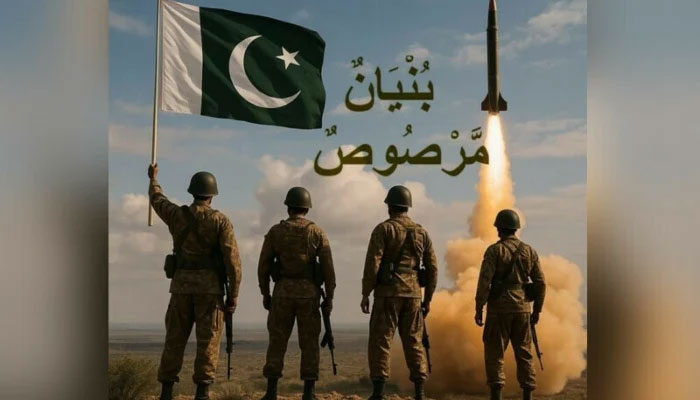In the ongoing conflict between India and Pakistan, military operations often carry deep ideological, national, and religious significance. One such operation, Operation Bunyan Marsoos, recently launched by the Pakistani military, has garnered attention not only for its military objectives but also for the faith-driven motivation behind it. This operation, seen by people as a defensive response to Indian aggression, was more than just a military engagement; to Pakistani Muslims, it represented Jihad and a path to Shahadat (martyrdom).
In contrast, Indian military forces, involved in the confrontation, often experience anxiety and fear of death, especially when confronted by what is perceived as the religious zeal of their adversaries. Operation Bunyan Marsoos, launched against Indian forces after their attacks on Pakistan’s civilian population, was framed by Pakistani religious leaders and military commanders as an extension of defensive Jihad. This understanding of Jihad is further strengthened by the aspiration for Shahadat, which represents martyrdom in the path of Allah. For those involved in this operation, the battle was not merely about defeating the enemy; it is about achieving martyrdom, considered the highest spiritual honor in Islam.
Martyrdom is central to the religious consciousness of the Pakistani soldier, who is taught that death in the path of Jihad opens the door to eternal rewards in the afterlife. Numerous videos have circulated on social media, showing Pakistani soldiers expressing their deep desire and joy at the prospect of martyrdom. For them, the fear of death is often replaced with a profound sense of divine purpose and spiritual fervor. Death is no longer seen as an end but as a transition to paradise.
The Quran and Hadith frequently emphasize the value of Shahadat, with the belief that a martyr’s soul is granted eternal peace and divine favor. This belief dramatically alters the psychological approach to warfare. Soldiers motivated by these teachings are driven not by fear or hesitation but by a sense of honor, duty, and commitment to their religious cause.
In the context of Operation Bunyan Marsoos, the message was clear: those who die in battle are not seen as victims but as witnesses to their faith. For Pakistani Muslims, the operation presented an opportunity to reaffirm their commitment to Islam by participating in what they viewed as a holy war. The connection between religious duty and military engagement provides significant psychological strength, transforming death from an obstacle to a goal. In this context, Shahadat is viewed as a reward rather than a loss. This perspective offers those fighting a sense of peace and acceptance in the face of potential death, as they believe their sacrifice serves a higher, divine purpose. On the other hand, Indian soldiers faced a different psychological reality. They confronted an enemy whose motivations are rooted deeply in spiritual and religious beliefs. For the Indian military, the battle is primarily focused on national defense and territorial sovereignty, rather than a religious or spiritual mission. This contrast creates a unique tension, as Indian soldiers recognize that their adversaries are driven by a blend of faith, ideology, and the promise of martyrdom, which does not play as central a role in their own motivations.
The fear of death may be more pronounced for Indian soldiers in this situation, especially when facing an enemy that does not fear death but embraces it as part of their divine mission. In contrast to the Pakistani view of Shahadat, where martyrdom is celebrated as an honor, Indian forces regard death as a tragic and unfortunate event to be avoided. In a secular military context, the concept of dying for a higher purpose is not as ingrained as it is in religiously motivated forces. For Indian soldiers, the psychological burden of fighting an enemy that sees death through the lens of religious zeal creates an environment of uncertainty and intimidation. This fear of death also leads to a psychological disadvantage for Indian forces when engaging in direct combat with an opponent who seems to be fighting for more than just national pride—they are fighting for spiritual redemption.
This contrast results in an imbalance in the battle, where one side is driven by a sense of spiritual victory while the other, despite its commitment to national defense, faces the natural fear of mortality. One of the central aspects of Operation Bunyan Marsoos was the ideological clash between the religious zeal of the Pakistani forces and the secular nationalism of the Indian forces. For Pakistan’s military, Jihad is not only a geopolitical struggle but a spiritual one. The soldiers see themselves as part of a divinely ordained mission, aligning their actions with a larger narrative of Islamic resistance. The concept of Shahadat strengthens the Pakistani soldiers’ sense of purpose, as they view their participation in the war as an act of devotion to Allah.
On the Indian side, however, the conflict was viewed primarily in terms of national sovereignty. The Indian military doctrine focuses on protecting the state, its territory, and its people. Indian soldiers face the inherent fear of death that comes from knowing their sacrifices carry no spiritual or religious reward. Death in combat is seen as a tragic loss rather than a transition to eternal life or a source of divine blessing. The stark ideological difference between these two perspectives creates a situation where religious passion and national survival intersect.
The outstanding success of Pakistan and the Pakistani Army in Operation Bunyan Marsoos serves as a wake-up call to both internal and external adversaries. For the Pakistani people and the armed forces, defending the country is not just a duty, but a matter of faith, and they are unafraid to give their lives for this noble cause. Our enemies should reconsider their actions and think carefully before launching any form of aggression against a nation with such unwavering faith.






Comments are closed, but trackbacks and pingbacks are open.